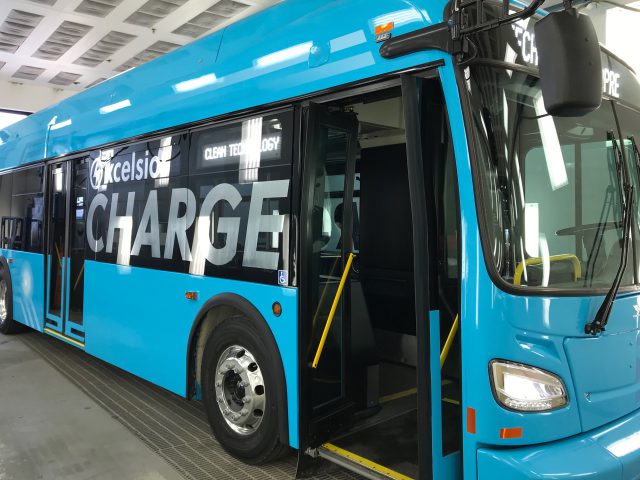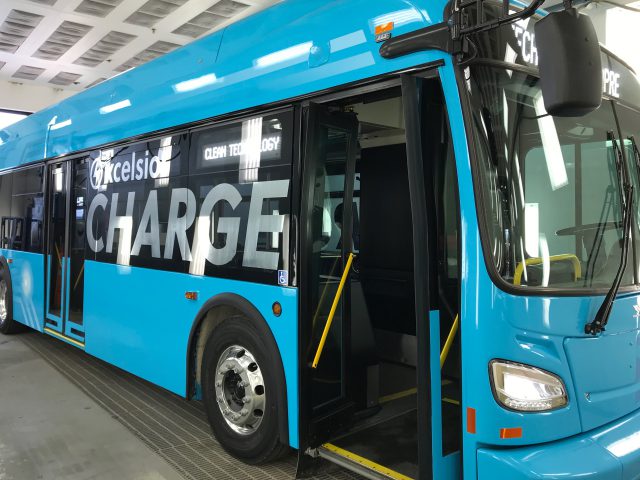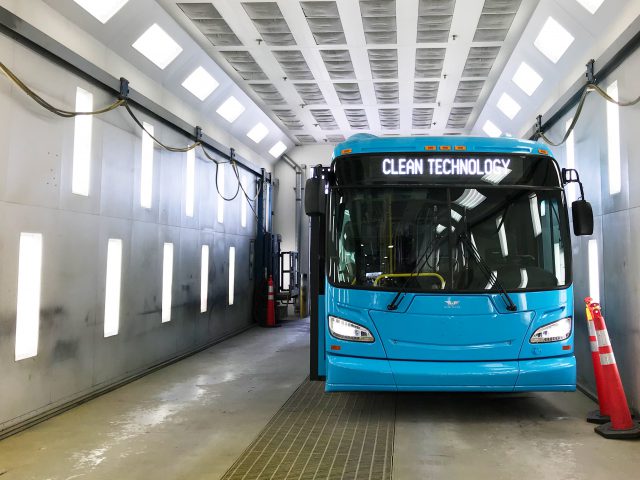I Love Transit 2018: TransLink keeps sustainability in focus
I Love Transit 2018: TransLink keeps sustainability in focus



It’s I Love Transit Week! A week where we celebrate our riders, transit enthusiasts and all the things we love about transit. This year’s theme is…Connections: the future of transportation in Metro Vancouver. One of the key elements of what the future of transit entails is sustainable transit. So, we chatted with Sarah Buckle, Director Enterprise Risk and Sustainability at TransLink what that actually means.
By Sarah Buckle, TransLink’s Director of Enterprise Risk & Sustainability
As TransLink provides people with alternatives to driving cars by expanding transit service, we dramatically reduce the region’s greenhouse gas (GHG) emissions and improve the air quality. Yet, for every bus we put on the road, we also emit GHGs by consuming fossil fuels. Extending transit is essential for our region and the environmental benefits of doing so can’t be understated. But, it’s also critical that we use low-carbon technologies to reduce our own environmental footprint.
My role is to lead the adoption and achievement of environmental commitments and the advancement of strategic sustainability initiatives that align with enterprise priorities. An example of this is developing a low carbon fleet strategy, demonstrating zero-emission battery electric buses, and procuring renewable fuels. These are no small tasks!
Just recently, TransLink’s Board of Directors and the Mayors’ Council approved the adoption of two very significant environmental targets – reducing TransLink’s GHG emissions by 80 per cent by 2050, and utilizing only renewable energy sources by that same year. These are ambitious goals that will require bold action through policy decisions, investment planning, and funding support.
One challenge when looking at new technology is the lack of benchmarking. To help overcome this challenge, starting in 2019, we’re piloting four zero-emission battery electric buses. TransLink was the first transit agency in Canada to commit to and gain funding for the first ever $40M Pan-Canadian Electric Bus Demonstration Project being led by Canadian Urban Transit Research and Innovation Consortium (CUTRIC).
We’re very excited to bring four fast-charging electric-battery buses to Metro Vancouver next year! https://t.co/w8lQE2pHdK. ^rw @CityofVancouver @bchydro @BowinnMa @GregMooredotca @jimcarr_wpg @MayorGregor pic.twitter.com/irZp6cx6te
— TransLink BC | Masks Mandatory (@TransLink) April 12, 2018
TransLink’s 2.5-year demonstration project will deploy four battery electric buses and two fast chargers into service in the Metro Vancouver region. It is expected that each electric bus in operation will reduce on-road CO2 emissions by close to 300,000 kg annually, and will save approximately $50,000 in fuel costs by switching to electricity from diesel. These buses will be able to recharge within 4―7 minutes at charging stations at each end of their route, which makes them both environmentally-sound and an efficient ride for customers. The results of the pilot program will provide further certainty to target fleet-replacement procurement in the early to mid-2020s, when experts believe the life cycle costs will provide a positive return on investment.
Before we transition to a zero-emission battery electric fleet, we are looking into lower-carbon interim options, including renewable natural gas and renewable diesel. The main challenges associated with renewable fuels is the price premium compared to conventional fuels and limited supply. By forming strong partnerships with our fuel suppliers, the success of utilizing renewable fuels for our fleet looks promising. Procuring low-carbon intensity fuels will provide a near-term bridge to a zero emission future.

Our environmental commitments don’t stop with our fleet, we have bus depots, operations and maintenance centres and passenger stations that we need to consider. At our facilities, we have done a lot over the years to reduce our energy consumption, including lighting retrofits, mechanical system upgrades, and building control projects. We are piloting heat-exchange projects at two of our transit centres with the goal of reducing our natural gas consumption and transitioning to renewable energy.
We are determined to reduce our carbon footprint of our fleet and our facilities at the same time.
As one of only five North American transit agencies (and the only one in Canada) recognized as a Platinum Level signatory of the American Public Transportation Association’s (APTA) sustainability commitment, it is not a commitment we take lightly. While transit is a more sustainable method of travel, we know we have to do our part to reduce our own environmental footprint.
Looking for more ways to celebrate I Love Transit week? Check out the blog for more opportunities to share your stories and win! Follow along on Facebook, Twitter, and Instagram too!






Glad to learn that TransLink is moving towards a low-emissions and sustainable transit fleet! I’m happy that TransLink had a head start on this initiative by having the visionary foresight to keep our electric trolley overhead network and renew the trolley bus fleet with our present generation New Flyer trolleys in 2005-2008. I am curious as to where the electric trolley buses fit in the strategy to reach the GHG reduction and renewable energy goals, and whether they will continue to be an integral part of that strategy in the future.
Hi VancityAlex!
Currently, we are entering Phase II of our Low Carbon Fleet Strategy and assessing all options for future low carbon fleet. The trolley network is part of the assessment and we will have a better understanding of our path forward mid-2019.
Trolleys should be renewed in approximately ten year’s time (the current fleet is approaching a dozen years old already) and battery electrics should be used to replace the diesels and diesel-electric hybrids as they come due for replacement.
To dismantle the trolley overhead network would be extremely costly, especially if then a corresponding network of battery electric charging stations is required.
St Albert Alberta has had 7 fully electric buses for a couple of year’s. We only have 55 busses not counting the electric buses. AND the first in Alberta to have fully electric busses.
Hi Paul!
Thanks for help shaping a low carbon future in Canada and we hope to learn about the experience in Alberta. ^tp